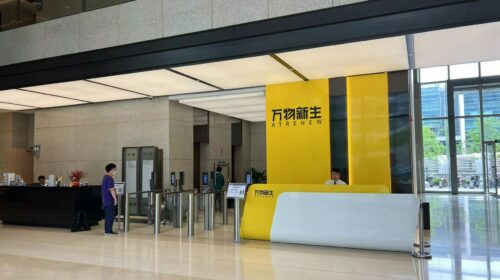AiHuiShou’s Q2 Revenue Rises 56%, Fueled by Growing Electronics Recycling Network

Company releases first ESG report alongside its maiden earnings, aiming to spotlight its role in achieving China’s carbon-reduction goals
Key points:
- AiHuiShou posts 56% revenue growth in its latest reporting quarter while continuing to operate in the red
- Company simultaneously released first ESG report highlighting its role in helping China to achieve its carbon-reduction goals
By Doug Young
Sometimes your best asset isn’t in your financial statements.
That seems to be the message coming from electronics recycling specialist AiHuiShou International Co. Ltd. (RERE.US), which has just conveniently released its first report on environment, social and governance, better known as ESG, alongside its maiden quarterly earnings. For those people out of the loop, ESG reports have become all the rage these days as companies try to show they are responsible corporate citizens and not just profit-making machines.
The reality is that China is placing huge importance on environmental protection these days – a fact that AiHuiShou, which also uses the name ATRenew, has latched on to quite tightly.
That’s because helping to execute government objectives has become a key ingredient to success for any company in China. That doesn’t mean companies that don’t align with such objectives are destined to fail. But ones that do align often receive both overt and more subtle forms of government assistance, ranging from grants to things like expedited approvals for new facilities.
China’s central leaders have made it very clear that carbon reduction is one of their key priorities, with the nation setting goals of reaching peak carbon emissions by 2030 and going carbon neutral by 2060. Recycling has become a key element of achieving that goal, since such recycling requires far less carbon-emitting energy use than creating new products from scratch.
That reality hasn’t been lost on AiHuishou, nor its founder Chen Xuefeng, also known as Kerry Chen, who prominently mentioned the government’s goals on both his company’s maiden earnings call and in a statement accompanying the release of its first ESG report.
“In accordance with China’s ‘14th Five-Year Plan’ for the Development of the Circular Economy released by the National Development and Reform Commission in July, we aim to further develop our supply chain capabilities for pre-owned electronic devices to promote sustainability and standardization of the industry,” Chen said on the call, making reference to China’s latest five-year planning cycle and its top state planner.
Investors were initially impressed with the broader message, including AiHuiShou’s latest results that showed its revenue rose 56.2% to about 1.87 billion yuan ($289 million) in the three months to June. The company’s shares rose 5.5% in Tuesday trade after the results came out. But they gave back all of that and a little more the next day, in an investor-style recycling act that shows the market still isn’t sure what to think about the company.
On a broader basis, the road for AiHuiShou has been similarly bumpy since it raised $254 million from its IPO in mid-June. Its shares initially jumped on big hopes for the company’s business model of buying used electronics from Chinese consumers and then inspecting and grading them to sell both online and offline for a healthy markup.
As one of the oldest companies in the space with a decade of history, the company looked well positioned to emerge as a consolidator in a fragmented space where it was the leader with 8.7% of the market for used electronics trading. But then the company got caught up in a broader clampdown on U.S.-listed Chinese companies, with the stock now trading down about 23% from its IPO price.
While that decline looks big, it’s actually relatively common and a bit milder than shares of some Chinese companies that have lost half of their value or more.
Data Security and Corporate Structure
New York-listed Chinese companies have come under fire from both China and the U.S. over the last few months, though for different reasons. China has voiced growing concerns about data security, singling out the Uber-like DiDi Global and trucking network operator Full Truck Alliance for criticism for making U.S. IPOs before getting required data security reviews.
Frankly speaking, data security shouldn’t be a major issue for a company like AiHuiShou, since the company’s main information is on who is buying and selling used electronics, which isn’t very sensitive.
The U.S. concerns could be more relevant, as they target a number of issues including a corporate structure called variable interest entity (VIE) that is used by nearly all Chinese companies that list in New York, including Aihuishou. In the latest development on that front, U.S. Securities and Exchange Chairman Gary Gensler warned this week of the unusual risk of investing in Chinese companies, as the regulator takes steps to make that risk clearer to American investors.
All that said, we’ll move on to a closer look at AiHuiShou’s latest quarterly results that show the company’s business posted strong growth in the second quarter even as it remains in the red.
The company derives the bulk of its revenue from selling used electronics, and has strong partners to help it do that in e-commerce giant JD.com, which owns 33.9% of the company. It also formed a major new tie-up with Kuaishou in June to both collect and sell its used electronics over China’s No. 2 video streaming platform, including providing its inspection services and products to broadcasters and merchants on Kuaishou’s vast network.
While used electronic sales accounted for the bulk of its 56.2% revenue growth, its newer services division posted stronger 78% growth to 264 million yuan, accounting for 14.2% of the company’s total revenue pie. In addition to big potential in services, which typically carry higher margins that product sales, the company also highlighted the potential for its sales through its emerging hybrid network of online and offline channels.
That company has been aggressively expanding that offline network, which comprised 862 stores at the end of June, up sharply from the 755 stores in its network at the end of March.
“We expect this to become a new driving force for our business growth in the second half of 2021,” Chen said on the call, referring to the company’s growing offline presence that is part of its broader online-offline sales strategy.
AiHuiShou is still squarely in the red, posting a 507.3 milllion yuan operating loss in its latest quarter, up sharply from 116 million yuan a year earlier. On an adjusted basis that excludes factors like the granting of share options, the company’s second-quarter operating loss grew by a more modest amount to 51.03 million yuan from 36.63 million yuan a year earlier.
In valuation terms, AiHuiShou looks relatively underappreciated compared with similar companies. Two of its most direct global peers, U.S. based ecoATM and France’s Back Market aren’t publicly traded, making AiHuiShou one of the first from its category to list.
But a good comparable might be U.S. C2C stalwart eBay, which trades at a current price to sales (P/S) ratio of about 4.2. By comparison AiHuiShou trades at a lower P/S of about 3. China’s Uxin, which operates a similar model by buying and reselling used cars, trades at a far higher 12, though the more mature but similar U.S. used car specialist Carmax trades at a P/S of just 0.9.
At the end of the day, AiHuiShou has an extremely valuable asset in its arsenal due to its alignment with China’s broader environmental protection aims. But its bottom line will ultimately be the most important factor, with investors watching closely to see if it can parlay its government goodwill and industry-leading position into eventual profitability.
The Bamboo Works offers a wide-ranging mix of coverage on U.S.- and Hong Kong-listed Chinese companies, including some sponsored content. For additional queries, including questions on individual articles, please contact us by clicking here.
To subscribe to Bamboo Works weekly newsletter, click here.





